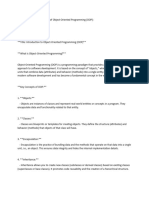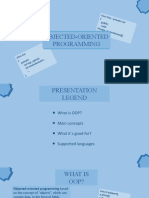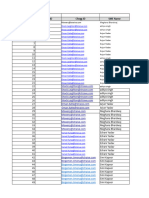0% found this document useful (0 votes)
9 views1 pageObject
Object-Oriented Programming (OOP) is a programming paradigm that utilizes 'objects' to encapsulate data and methods, enhancing reusability, scalability, and modularity. The key principles of OOP include encapsulation, abstraction, inheritance, and polymorphism, which facilitate better program structure. OOP offers benefits such as code reusability, modularity, scalability, and improved security.
Uploaded by
Adarsh PandeyCopyright
© © All Rights Reserved
We take content rights seriously. If you suspect this is your content, claim it here.
Available Formats
Download as DOCX, PDF, TXT or read online on Scribd
0% found this document useful (0 votes)
9 views1 pageObject
Object-Oriented Programming (OOP) is a programming paradigm that utilizes 'objects' to encapsulate data and methods, enhancing reusability, scalability, and modularity. The key principles of OOP include encapsulation, abstraction, inheritance, and polymorphism, which facilitate better program structure. OOP offers benefits such as code reusability, modularity, scalability, and improved security.
Uploaded by
Adarsh PandeyCopyright
© © All Rights Reserved
We take content rights seriously. If you suspect this is your content, claim it here.
Available Formats
Download as DOCX, PDF, TXT or read online on Scribd
/ 1







































































